by Divya Gupta, Mosharaf Hossain, Sarvesh Shukla, Varsha Singh, Anriban Nath, and Swati Nayak
Uttar Pradesh, the most populous state in India, heavily relies on rice as a staple food, making rice farming a crucial economic activity for millions of farmers. However, rice production in the state is not very productive and profitable. The main hindrances among the diverse rice-growing environments in the state include the slow introduction of new rice varieties and a fragile system for providing quality seeds of high-yielding and climate-resilient rice varieties.

Uttar Pradesh, the most populous state in India, heavily relies on rice as a staple food, making rice farming a crucial economic activity for millions of farmers. However, rice production in the state is not very productive and profitable. The reasons behind this issue are varied and complicated.
The main hindrances among the diverse rice-growing environments in Uttar Pradesh include the slow introduction of new rice varieties and a fragile system for providing quality seeds of high-yielding and climate-resilient rice varieties.
Despite numerous new rice varieties, farmers cultivate predominantly older ones like Swarna, Samba Mahsuri (BPT-5204), and Sarju-52.
According to the 2020 Production Oriented Survey by the Indian Council of Agricultural Research (ICAR), Swarna and Samba Mahsuri cover 31% and 25% of the rice cultivation areas, respectively. Both varieties have been around for almost 40 years,
The ICAR survey also showed that about 45% of the seed requirements of rice farmers were met through seeds saved from their farms. This percentage is even higher for small and marginal farmers. The overall seed replacement ratio for the state stands at approximately 43% for rice and only 38% for small-scale farmers. The slow pace at which new rice varieties are adopted in the state significantly affects productivity and profitability.
Ensuring farmers have better access to high-quality seeds has always been a central focus of Seed System Initiatives at the International Rice Research Institute (IRRI). IRRI continually explores various seed system models to benefit small community organizations led by farmers.
In recent years, particular emphasis has been placed on community-led seed networks, especially those managed by women’s organizations.
In India, public enterprises such as state and national seed corporations primarily produce and distribute seeds, particularly for inbred rice varieties. However, these agencies face various limitations in their capacity to supply quality seeds to the vast number of farmers.
Hence, community-managed seed production networks are crucial in enabling farmers to meet their seed requirements independently as well as promoting seed entrepreneurship for their livelihoods.
To address these challenges, the IRRI Seed System Team is actively involved in incubating several farmer-led groups in India and Bangladesh. This initiative involves a comprehensive capacity development program covering seed production techniques, acquiring seed licensing and registration as growers, market intelligence for effective product placement, and establishing institutional connections for sourcing basic seeds for multiplication.
IRRI collaborated with Aparajita Samajik Samiti, a community-based non-government organization (NGO) with strong ties to the farming community and seeks to empower women smallholders through improved agricultural practices.
The team held an intervention, attended by 125 farmers, including 80 women from 15 self-help groups (SHGs), in Baharich and Gorakhpur Districts of Uttar Pradesh in December 2022.

The initiative aimed to introduce optimal agronomy practices, manage environmental stresses, address the gap in the seed supply and demand, promote quality seed production among farmers, and improve postharvest techniques to maintain seed quality.
The participating farmers were trained in seed sorting, cleaning, processing, packaging, and establishing market connections. The training also emphasized the selection of improved, high-yielding, stress-tolerant, biofortified, and climate-resilient rice varieties along with premium-quality rice varieties for seed production.
It also highlighted IRRI’s commitment to supporting and nurturing women-led SHGs engaged in seed production to benefit rice farmers and promote entrepreneurship. This was crucial as many of the participants were new to seed production and marketing and required substantial assistance. This farmer-driven network holds substantial promise in supplementing the conventional seed distribution system and advancing the interests of rice farmers and individuals involved in seed entrepreneurship.
In this regard, the IRRI Seed System Team and its implementing partner, Aparajita Samajik Samiti, devised a plan to help farmers choose highly marketable rice varieties and supply first-generation seeds for production and trade for the 2023 karif season.
The step-to-step planning for providing quality seed productions for the 2023 kharif season is as follows:
Distributing the seed. A total of 245 kilograms of paddy seeds from nine different varieties namely Swarna Samriddhi, CG Devbhog, HUR-917, MTU-1156, Rajendra Saraswati, Bauna Kalanamak-102, Kalanamak-KN3, Kalanamak Kiran, and Kalanamak SL-03 have been distributed. These seeds will be used for cultivation during the kharif season. Diversifying the varieties is a good practice as it can help farmers adapt to different growing conditions and market demands.
Identifying beneficiaries. The seeds were distributed to 26 farmers, including members of community-based SHGs members that empower small-scale farmers, particularly women, to enhance their livelihoods and economic opportunities.
Promoting collaboration. The program is a collaborative effort between Aparajita Samajik Samiti and the IRRI South Asia Regional Centre (ISARC) in Varanasi. Collaborations between community-based NGOs and research institutes combine local knowledge and resources with scientific expertise to achieve sustainable agricultural goals.
Enabling continuous seed production. The seeds distributed to farmers are intended to produce a total of 19,600 kg of seed during the kharif season. These seeds will be sown by the farmers to produce the next generation of seeds. This process helps ensure a continuous supply of quality seeds for future seasons.
Testing crop varieties. Distributing seeds of different varieties suggests that there might be an element of varietal testing involved. Farmers can assess which varieties perform best in their local conditions vital for sustainable and climate-resilient agriculture.
Capacity building. In addition to seed distribution, intensive capacity-building training activities are being conducted. This can include best agricultural practices, seed management, pest and disease control, and postharvest techniques to maintain seed quality.
Empowering smallholder farmers. Involving individual farmers and SHGs aims to empower farmers, especially women, by providing them with access to quality seeds and modern cropping knowledge. This empowerment can lead to increased agricultural productivity and improved livelihoods.
By addressing these aspects, the initiative contributes to the broader goals of improving agricultural productivity, enhancing rural livelihoods, and fostering regional agricultural sustainability. Initiatives like this will not only promote sustainable agriculture in Gorakhpur but in the state of Uttar Pradesh.

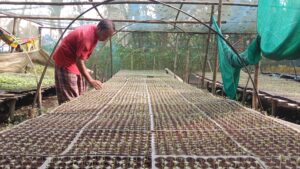
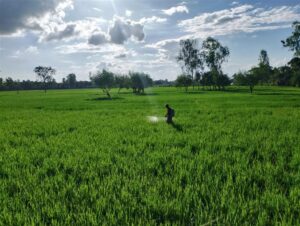
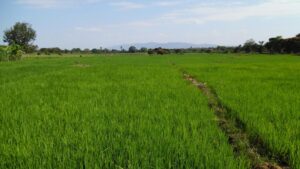
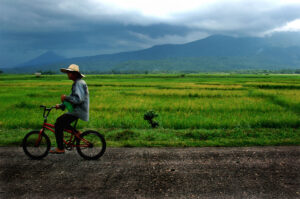

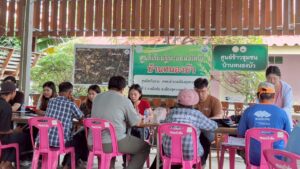
Seed Replacement Ratio for rice in Uttar Pradesh can’t be 439%. There may be some error in mentioning that information.
The figure should be be 43%. We have corrected it. Thank you for taking the time to point out the error.